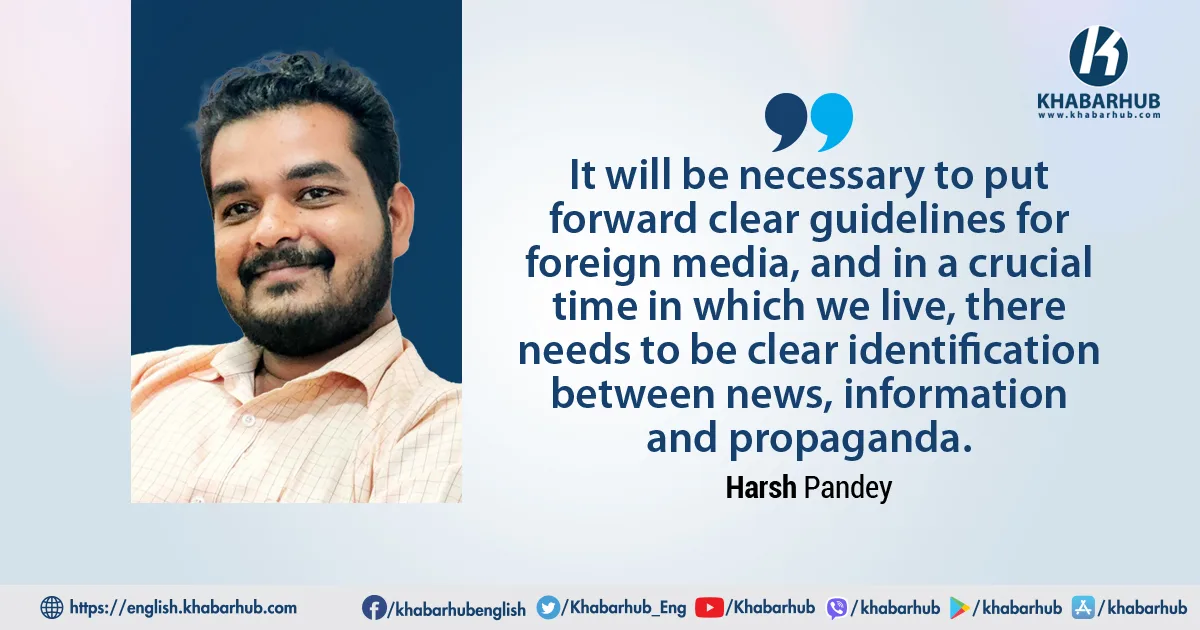A recent report published by a Think Tank titled China’s Influence in Nepali Media Amid Aggressive Nepal Policy explains in detail about how much influence China is wielding in Nepal’s media.
In a nascent democracy like Nepal, media works as a fourth pillar in the democratic institutions and can be interventionist in the adoption of policy measures by the country.
This is what exactly happened, according to this report, where China’s aggressive foreign policy in Nepal has been clubbed with pro-China news outlets, causing problems for the day-to-day democratic functions in the country.
Independent media critically analyses policies and decisions by the government, and foreign policy also comes into play in that gambit.
However, these pro-China outlets and the embassy of China in Nepal have tried to curb dissenting views on China.
The report further explains how an organised system of pro-China media outlets has penetrated inside Nepal despite an overt ban by Nepal on foreign investments in media.
It is worth noting that China has tried using these techniques in almost all democracies; somewhere, it was successful, and somewhere, it did not.
Many news articles, videos, and radio podcasts by pro-China outlets feel like benign suggestions to the audience of the host countries, but in actuality, these are the tools for Chinese propaganda.
In countries like Nepal and some African states, these campaigns have become increasingly threatening to those countries’ political elites.
The Nature of Chinese Influence in Nepal Media
The report cites an example of how Chinese propaganda works, “There is a video posted on February 27, 2022, on the Facebook page of the Nepali online portal, www.nepal.cri.cn, which is operated by China Radio International, headquartered in Beijing. In the video, a Chinese correspondent named Lalima explains in Nepali language how the decision of Nepal to accept the Millennium Challenge Corporation (MCC) grant could pave the way for the US military personnel to trample boots upon Nepali soil”.
The work of these outlets is not limited just to providing pro-China content. It campaigns vehemently against any news article published against China.
At that time, Nepal Congress’s Sher Bahadur Deuba was Prime Minister.
Nepal’s Parliament ratified the grant, but it took them more than five years to work on it as the grant was signed between the United States and Nepal way back in 2017 when Nepal became part of the Belt and Road Initiative.
It is worth noting that all countries in the world are very sensitive regarding the sovereignty issue.
Dubbing the USA in the image of a coloniser and claiming that it will take the autonomy of the country is absurd at best.
It is not the only time Chinese media has said anything against the MCC; after that, it has published much content against it.
As the report has mentioned, it may seem like a benign suggestion to Nepal, but it is not.
If we minutely analyse the semantics of these contents, we will know that it is a form of patronisation by China where the ‘suggestions’ are given to Nepal.
If Nepal does not follow them, it will be in grave danger. The same has been the attitude of Chinese journalists stationed in Nepal; while they ferociously wrote against the MCC, which is a grant, they never mentioned the pitfalls of BRI, which is a series of loans.
A US State Department spokesperson commented on the whole MCC row that, “Whether the Nepali government ratifies the MCC electricity-transmission project is a sovereign decision for Nepal to make…Should outside influence and corruption cause Parliament not to ratify, it would be deeply concerning for the US and a loss for the people of Nepal.”
It clearly indicated that active campaigns of disinformation were published against the project.
As mentioned above, Nepal has not allowed foreign investment in media. China has heavily invested in pro-China media outlets in Nepal to bypass this.
The mounting pressure on the Nepal government led it to refute the report. However, the district official of the Humla district and one Congress leader found and reported that Nepal’s land was encroached on by China.
These are owned by China-friendly journalists and industry people. It includes radio, websites, and even TV Channels.
The work of these outlets is not limited just to providing pro-China content. It campaigns vehemently against any news article published against China.
A case in point was an op-ed piece published in The Kathmandu Post titled, ‘China’s Secrecy Has Made Coronavirus Crisis Worse’; with it, there was a picture of Mao Zedong wearing a mask.
The head of China Media Group in Nepal published a video criticising the article, saying that it undermines the sovereignty of China. In reality, it is visible that it is undermining Nepal’s sovereignty.
China has profited from Nepal’s democracy and emerging market, where it trains Nepali journalists in Chinese language courses just before the coronavirus pandemic.
It should be noted that Nepal is not the only country that has found itself at such a crossroads where it is trying to maintain a balanced and healthy relationship with its neighbour, and in return, its voice gets suppressed by all the noise created by the neighbour.
A cohort of 57 journalists got three months of training from the Confucius Institute of Nepal and the Nepal-China Media Forum.
In this way, the Nepal-China Media Forum has tried to create a cohort of journalists who will have a ‘better’ understanding of China than anyone else.
The report suggests that it creates unnecessary pressure on journalists who are critical of China.
It cites the example of the late journalist Balram Baniya, who wrote a report on China’s encroachment on seven districts of Nepal.
The mounting pressure on the Nepal government led it to refute the report. However, the district official of the Humla district and one Congress leader found and reported that Nepal’s land was encroached on by China.
While the bureaucrat has been transferred to a remote location, the Congress leader was accused of being ‘pro-Indian’ and ‘pro-Tibet’.
Later, a high-level committee by Nepal found that China encroached on the border and controlled the water resources.
This tactic of China to use all possible means to create a system where critical thoughts and any dissenting views against it will be aggressively suppressed is at the core of the pro-China media groups.
It has also tried to bombard the Nepali audience with China-related content.
It will also be necessary to put forward clear guidelines for foreign media, and in a crucial time in which we live, there needs to be clear identification between news, information and propaganda.
It should be noted that Nepal is not the only country that has found itself at such a crossroads where it is trying to maintain a balanced and healthy relationship with its neighbour, and in return, its voice gets suppressed by all the noise created by the neighbour.
Other States Where Chinese Media Has Such Influence
It is not only in Nepal but in other areas such as Africa (which in many ways was the test case for China), Europe, and even the United States of America; China has curated media systems that work for its benefit.
In Africa, China’s state news agency Xinhua maintains 37 offices in different African countries.
China developed satellite TV networks in African countries, and there are multiple channels on those TV networks which only talk about Chinese progress, growth and what it has achieved.
It is not that the states of the Global South only have such penetration by the Chinese media.
A report by Reuters found that there are 33 China Radio International (CRI) stations in 14 countries, from Europe and the United States of America to Australia.
Conclusion
The explosive report that was published will surely ring a bell among the political elites of Nepal.
It will also rejuvenate civil society about the importance of free and fair media in democracy.
It will also be necessary to put forward clear guidelines for foreign media, and in a crucial time in which we live, there needs to be clear identification between news, information and propaganda.
It is essential to preserve the vibrant democracy of Nepal, which it paid a heavy cost for.
(Harsh Pandey is a Doctoral Candidate at the School of International Studies, Jawaharlal Nehru University. He is also a Life Member of the International Centre for Peace Studies)









Comment